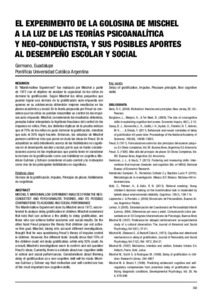Por favor, use este identificador para citar o enlazar este ítem:
https://repositorio.uca.edu.ar/handle/123456789/11168| Título: | El experimento de la golosina de Mischel a la luz de las teorías psicoanalítica y neo-conductista, y sus posibles aportes al desempeño escolar y social Mischel´s marshmallow experiment analyzed from the neoconductist and psychoanalitic theories, and its possible contributions to academic and social performance |
Autor: | Germano, Guadalupe | Palabras clave: | PSICOLOGIA; PSICOLOGIA COGNITIVA; PSICOLOGIA DEL NIÑO; PRINCIPIO DE PLACER; ADAPTACION; HABILIDADES NO COGNITIVAS | Fecha de publicación: | 2015 | Editorial: | Universidad de Buenos Aires. Facultad de Psicología | Cita: | Germano, G. El experimento de la golosina de Mischel a la luz de las teorías psicoanalítica y neo-conductista, y sus posibles aportes al desempeño escolar y social [en línea] VII Congreso Internacional de Investigación y Práctica Profesional en Psicología XXII Jornadas de Investigación XI Encuentro de Investigadores en Psicología del MERCOSUR, 2015. Disponible en: https://repositorio.uca.edu.ar/handle/123456789/11168 | Proyecto: | El experimento de la golosina a la luz de las teorías psicoanalítica y neo-conductista y sus posibles aportes al desempeño escolar y social | Resumen: | Resumen: El “Marshmallow Experiment” fue realizado por Mischel a partir
de 1972 con el objetivo de analizar la capacidad de los niños de
demorar la gratificación. Según Mischel los niños pequeños que
pueden lograr una demora de la gratificación auto-impuesta son
quienes en su adolescencia obtendrán mejores resultados en los
planos académico y social. En la teoría propuesta por Freud se considera
que los niños no podrían desarrollar un control de los impulsos
auto-impuesto. Mischel, considerando los resultados obtenidos,
pensaba haber interpelado la hipótesis freudiana del control de los
impulsos en niños. Pero, las distintas réplicas de la prueba indican
que el 70% de los niños no pudo demorar la gratificación, mientras
que solo el 30% logró hacerlo. Abstract: The Marshmallow Experiment done by Mischel since 1972, was intended to analyze delay gratification in children. Mischel considered that kids that can achieve a the ability to delay gratification, are those who can achieve better academic and social results. On the other hand Freud propose the theory that children can not achieve this goal. Mischel, taking into account different investigations, thought that he was questioning Freud´s theory of impulse control in children. However, the different tests´ results show that 70% of the children could not dealy gratification, while only 30% could. As a result, Mischel´s investigations seem to confirm and not question Freud´s ideas. Currently, there is a debate about non-cognitive skills in school and social performances. |
URI: | https://repositorio.uca.edu.ar/handle/123456789/11168 | Disciplina: | PSICOLOGIA | Derechos: | Acceso abierto | Fuente: | Jornadas de Investigación y Encuentro de Investigadores en Psicología del Mercosur Año 2015 |
| Aparece en las colecciones: | Ponencias |
Ficheros en este ítem:
| Fichero | Descripción | Tamaño | Formato | |
|---|---|---|---|---|
| experimento-mischel-luz-teorias.pdf | 37,53 kB | Adobe PDF |  Visualizar/Abrir |
Visualizaciones de página(s)
287
comprobado en 30-abr-2024
Descarga(s)
179
comprobado en 30-abr-2024
Google ScholarTM
Ver en Google Scholar
Este ítem está sujeto a una Licencia Creative Commons

